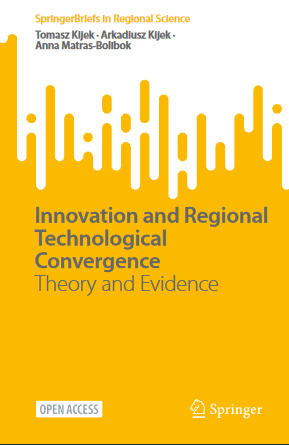موضوعات
آموزش و پرورش
ادبیات و زبان
پزشکی، دندانپزشکی و داروسازی
تاریخ و جغرافیا
داستان و رمان
دیگر
دین و فلسفه
روانشناسی
ریاضیات و آمار
سلامتی، تناسب اندام و رژیم غذایی
شیمی و پلیمر
علوم اجتماعی و حقوق
علوم زیستی و بیوتکنولوژی
فیزیک و نجوم
کامپیوتر و اینترنت
کتابهای کودکان و داستان
کسب و کار و اقتصاد
کشاورزی و دامپزشکی و غذا
معماری
مهندسی و فناوری
هنر و تئاتر
محصولات
Innovation and Regional Technological Convergence Theory and Evidence - Original PDF
نویسندگان: خلاصه: The concept of income convergence has drawn the attention of many economists involved in the growth debate (Alataş, 2021). Recent theories of growth and empirical studies suggest that heterogeneity with respect to technological conditions in general and total factor productivity—TFP in particular are identified as the most decisive factors for the rate of income convergence of countries (Islam, 2003). Apparently, depending on whether initial TFP differences decrease or increase over time, income convergence or divergence may be a matter of fact. This has directed researchers’ attention to the concept of technological (TFP) convergence. Although many empirical studies try to find the answer to the question of technological convergence at the country level (Dowrick & Nguyen, 1989; Wolf, 1991; Dougherty & Jorgenson, 1997; Tebaldi, 2016; Rath & Akram, 2019), regional technological convergence is the research area of relatively modest exploration. However, this situation started to change, since the importance of technological convergence and its determinants have progressively gained attention in both the scientific and the policy domains at the regional level (Rodil-Marzábal & Vence- Deza, 2020). In the context of the Lisbon Agenda (European Council, 2000) and the Europe 2020 strategy (Commission of the European Communities, 2010) goals of making Europe and its regions the most competitive and dynamic knowledge-based economies in the world, it seems crucial to find whether innovation, regarded as the main driver of regional TFP growth (Dettori et al., 2012), can stimulate technolog- ical convergence and under what conditionsآیا کتاب مورد نظر هنوز بر روی سایت قرار نگرفته است؟ جای نگرانی نیست! کافی است بر روی گزینه سفارش کتاب کلیک کرده و درخواست خود را ثبت کنید. در کمتر از چند ساعت کتاب شما را آماده خواهیم کرد.
